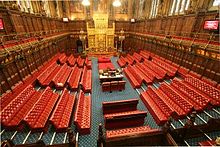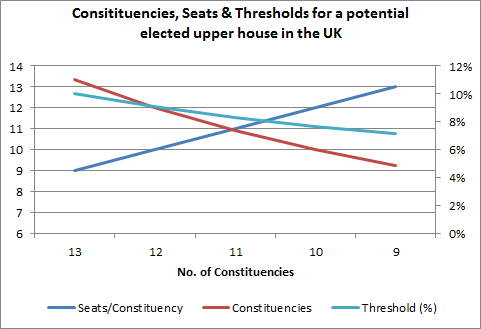So it seems that the next big Parliamentary drama is going to be House of Lords reform.

The Coalition Government’s original proposals last year were amended in an announcement earlier this week. [ Explanatory Notes ]
The Politics
Dave, that’s me, not Cameron says “Elections good, 15 year terms bad! “
Obviously the hereditaries should be excluded, and having a fully elected 2nd chamber is an essential reform for a modern democracy but this replacement scheme looks a bit shit.
- It’s not 100% elected.
- The use of STV and the consequent decision to have new (huge) electoral districts is wasteful and dissipates accountability, as will the single term limit.
- The use of classes, when finally complete, some time about 2030, will inhibit the rate of change in the new House of Lords, thus inhibiting voter’s control; under ⅓ the membership will be replaced at each election.
- It proposes to elect a “Senator” for a single 15 year term, which is a bit excessive
- They won’t be able to seek re-election. Is this really what we want?
- There’s no recall, nor any statement of disqualifying actions. Once in, they’re in for 15 years.
This isn’t good enough.
The proposed new chamber will remain a force for conservatism, the country has changed it’s mind several times as to how it wants to organise and run itself. In 1945, it turned to Social Democracy, in 1979, it turned to Thatcherism, and rejected it in 1997. Non of these political changes were truly represented in the House of Lords. One of the things that we i.e. voters need elections for, is the ability to express our views, give direction and sack miscreants. You can’t do this with 15 years terms, no recall and only electing ⅓ of the membership every 5 years. It should be born in mind that with the 120 elected seats per election, and potentially 90 appointed, the size of the democratic voice is once again minimised.
Some of course believe that House of Lords should be a counter-weight to the majority in the House of Commons, and that Government’s should be restrained from doing things!
Some oppose it because they believe we’ll be creating a legislative body with permanent Lib Dem control; I am more curious about how easy and hard it will be for new parties to break into Parliament. While I certainly don’t want to see the BNP with peers, I’d welcome Green and Pirates, maybe even another SOS NHS candidate, or anti-corruption candidates such as Martin Bell. This fear of empowering the centre party depends on what you think is going to happen to the Lib Dems; their sister party in Germany, the FDP faces annihilation due to the threshold laws as happened to them in the Berlin State assembly.
The current proposal will cause a massive lag between changes in the country and changes in the new House of Lords; it might protect the Lib Dems and the Tories against the backlash and as hinted above make it hard for the Greens, Pirates and Respect to find their voice. I have no problem with a revising chamber being more mathematically representative of the political views of the electorate and we need to recognise that Labour and the Tories are winning a declining share of the vote. It is becoming less likely that a single party Government has the support of the majority of the people and maybe our national institutions should reflect this.
The new constituencies will have no community, neither voters, nor candidates will identify with their them, and in the case of victorious candidates their electorate, since they will have such a small share of the vote, see below, and not require to be re-elected.
At the end of the day, I reckon this whole proposal is too poor to support, and we’d have to wait too long for it to actually come into being.
ooOOOoo
There are some interesting, depending on your hobbies, technical issues, which I have had a look at in more detail
Classes
The proposal is that the the new House of Lords, consists of 360 elected representatives, with 120 being voted on at each election. Each representative would have about a 15 year term, during which two further elections will have taken place. There will be a Senior, Middle and Junior class, having been elected two elections previously,or one election previously orat the last election respectively. Only ⅓ of the full elected membership will change at each election.
S.T.V.
The draft proposals state that the constituencies will need to be much larger and makes the point that in the UK there are 12 constituencies in the UK for election to the European Parliament.

This table shows the impact of varying the number of seats per constituency or the number of constituencies. I have estimated the total UK electorate at 45m. The Mandate row shows the number of votes required to win a seat if the turnout was 100%. The Threshold row sates the proportion of the vote required to win a seat. The threshold is calculated by dividing the number of voters by the number of seats plus one, and adding one. (In a 9 seat constituency, the threshold is one vote over 10% i.e. 9 seats are elected accounting for 90% of the votes and the last 10% do not count towards a win.) The formula for the threshold is
((No of Voters)/(No of Seats in a Constituency + 1) +1 )
I have greyed the 12 constituencies column, which is as the European Parliament elections, but implementing equally sized constituencies is hard, since recognising sensible boundaries, such as London and Scotland means that the constituencies will need to be of different sizes and this have different number of seats and thus different thresholds.
The table above is illustrated in chart form below.

This shows that as the number of constituencies falls, the number of seats/constituency rises and the mandate (winning vote score) and threshold falls. A number of Proportional Voting systems place a threshold on the ability to win seats. In Germany, a party needs to win three seats or 7% of the total vote before any seats can be won. In the table above, the threshold varies from 7.1% to 10%. The threshold for victory becomes smaller as the number of seats/constituency increases and the size of the Constituency increases. It should be noted that in the London Mayor elections, only Labour and the Tories got over 5%, although we should look at the London List results for a better view of how large STV like counts would work in large seats. (I haven’t done one yet).
Also with STV, the mandate is individual, electors no longer have parties to help keep representatives accountable to their promises. Some consider this an advantage in the system; it’s up to you. Mind you, with the prohibition on re-election, withdrawing the whip, or expulsion ceases to be a useful threat.
Fully Elected
As I write this article, I came to think about the proposal to appoint 10% of the membership. My principled position is that it should be all elected; I wondered if it might be useful for the government to appoint members to the Upper House to act as Ministers, and to allow the Upper House to hold the government to account. Recently, much legislation has been started in the Lords as they run out of time in the Commons; interestingly, the Parliament Act can’t be used on legislation started in the Lords. The history of Lords Reform has been so far based on the needs of reforming governments to remove a conservative obstacle to their plans. Lloyd George in 1911 introduced the Parliament Act which abolished their veto on legislation, completely for money bills and replacing it with a (de-facto) two year delay for other laws. Attlee’s 1945 Labour Government reduced the delay to ease the passage of Iron & Steel Nationalisation laws. The Blair reforms, reducing the number of hereditary peers were negotiated, and the Labour dominated House of Commons (1997 – 2010) was unable to come to an agreement as to critically the proportion of elected vs. nominated members. It seems that a proportion needs to be nominated to win the House of Commons vote, and there is an argument that non-party experts, cross benchers, will find it harder to obtain seats if there are no appointments. I am not impressed with this argument, such expertise can be acquired using a select committee system. Is it a good idea to give the Government a Lord’s payroll vote? I can see the argument beause all reform so far has come when the Lords oppose a more recent mandate and the 15 year term and class based turnover make a further impasse more likely not less.
The 90 Appointees
Is their appointment for life, for 15 years or for the life of a parliament? It’s not clear to me! If for life then we create the a similar monster to the US Supreme Court, where its majority lives for years or decades beyond the life of the political movement that created it. Are they appointing ⅓ per parliament, or does the “Appointments Commission” get to make 90 new members for each parliament? If so, we get to elect 120 members and a quango gets to appoint 90. This is unclear and unsatisfactory.
Who makes the appointers? The House of Lords Appointments Commission, which also deals with Crown Honours claims to be appointed via an open competition by the Commissioner for Public Appointments, currently Sir David Normington, GCB. I suspect that open means anyone can apply, not that the decisions, criteria, interviews and advice (aka lobbying) are published.
What Labour said in 2010
In their 2010 manifesto, the Labour Party said,
“We will ensure that the hereditary principle is removed from the House of Lords. Further democratic reform to create a fully elected Second Chamber will then be achieved in stages. At the end of the next Parliament one third of the House of Lords will be elected; a further one third of members will be elected at the general election after that. Until the final stage, the representation of all groups should be maintained in equal proportions to now. We will consult widely on these proposals, and on an open-list proportional representation electoral system for the Second Chamber, before putting them to the people in a referendum.”
So staged, 100% elected, open list not STV and an entrenching referendum. It’s silent on classes, terms and recall.
Labour’s promise needs to be viewed in the light of the debates that occurred in the Commons, where issue of the proportion of elected vs. nominated led to a failure to agree, and also I return to a theme the lack of democracy in the Labour Party during 1990’s and 2000’s, and possibly the influence of Lord’s Falconer, Adonis and Mandelson. I can’t believe that ordinary members believe that it shouldn’t be fully elected, I know I don’t.